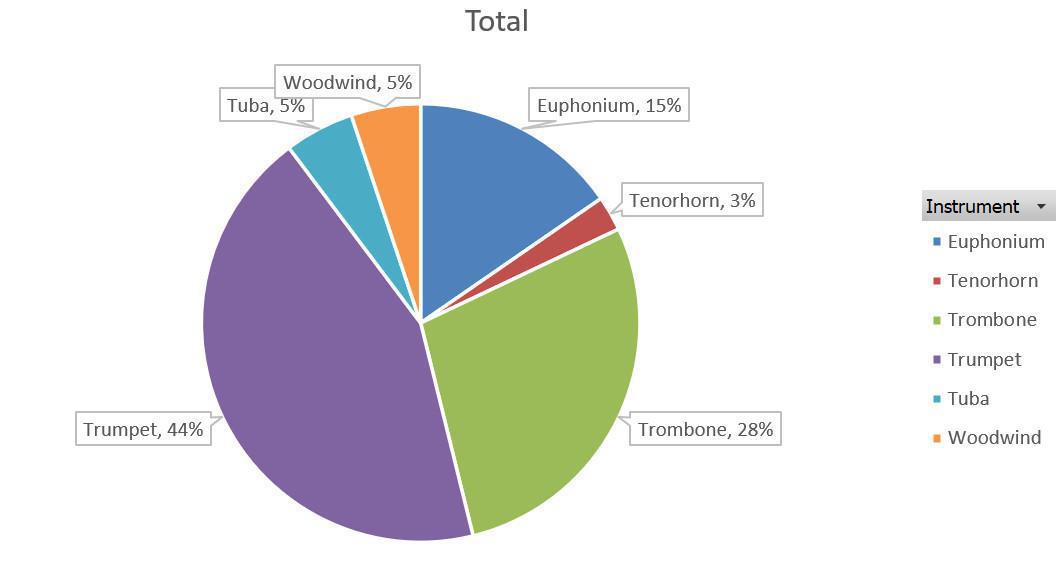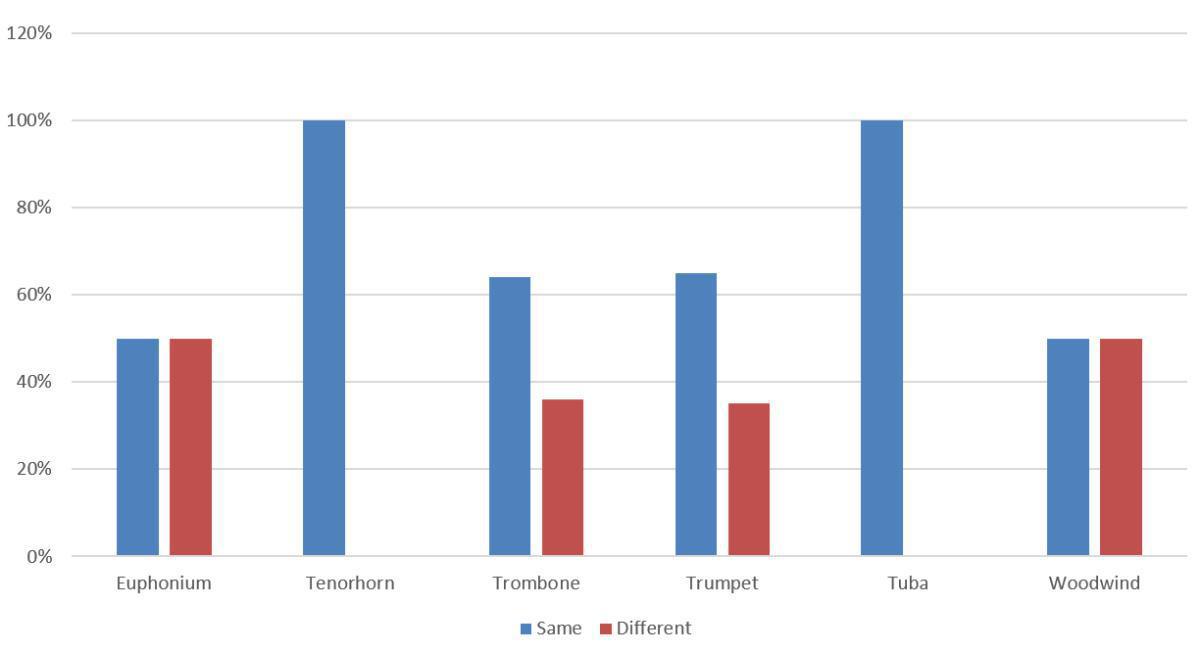Over the last month we conducted a surey of how many different mouthpieces one musician might use. Do you use the same mouthpiece on everything you play, or do you have multiple different mouthpieces to accomplish different styles of playing on the same instrument. Since there is no right or wrong answer to whether you should play one or multiple, we reached out to you to get your thoughts. Here are our finding.
Below you can see the breakdown of survey takers by instrument, and then whether each instrument category favored playing on the same mouthpeice or different. Keep scrolling to read some of the thoughts of our survey takers.
Trumpet: 65% Same / 35% Different
Different:
"I used to play 1st cornet in my main job at the Athens Municipal Concert Band, classical music in concerts and recitals, lead trumpet at the Athens big band and salsa bands plus much piccolo trumpet. So the playing situations varied so much that was extremely tiring to use only one mouthpiece and the sound concept aslo was not ideal for me to use my classical mouthpiece in a salsa gig or my trumpet mouthpiece in a cornet. I believe that it is easier to use the right tool for the job."
"I play mostly in orchestra and concert bands and use the same for most settings; however, at times for concert bands when playing broadway show or jazz pieces I’ll change to a shallower mouthpiece. When using a piccolo Trpt., or Flugelhorn I use different mouthpieces to achieve the sound and range that I want."
Same:
"I found a mouthpiece that is comfortable on my chops and allows me to play the full range of the Horn comfortably.."
"It provides consistency and a sense of comfort so that you can manipulate the style easily."
Trombone: Same 64% / Different 36%
Different:
"I use a *** for most of my playing as it gives me the resonance and direct sound I'm looking for. I then also use a standard *** as this gives me the warmth and works well for soft and gentle timbres"
Same:
"To be accurate, I use the same rim size for the tenor and alto trombone and the euphonium, but the cup varies."
Euphonium: Same 50% / 50%
Different:
"Some are better for high range and projection in outdoor concerts. Others , such as the SM4U or the H4ABL, have better resonance in indoor settings. And sometimes when I am tired, I like to go with a lighter MP, such as an SM4 vs an Ultra."
"I have 3 different instruments with 3 different bore sizes. I try and match the piece to the instrument in general, but I find I need to fine tune things even on the large trombone for example to get the right tone color and projection needed for the gig. It really depends on the style of the music for me, then I go from there. I would love if I could play everything on a 5 sized rim but you end up sacrificing the right tone color needed for each individual instrument. "
Same:
"The consistent response I get from the mouthpiece helps me play in whatever style I need."
"I play primarily in a band and occasionally solo with piano or brass duet. I find that one mp fits those playing circumstances. "
Tuba & Tenor Horn: Same 100%
"I play a Denis Wick mouthpiece - excellent work- Thank you!"
"Consistency / security. I know exactly my sound & capability across the range. When I want something to improve I don’t blame the instrument or mouthpiece I just work at it (& try to be patient!)"
Woodwind: Same 50% / Different 50%
Same:
"I feel the change in style comes from myself, my plying ability and my reeds. "
Different:
"Different situations call for different styles; different mouthpieces are called for.."
Conclusion
Across all the comments from our survey takers, the common reason that they stayed with the same mouthpiece for consistancy and comort. One of the reoccurring comments from muti-mouthpiece players was that they used different mouthpieces to facilitate a different sound or different style depending on the ensemble they played with.
How many different ensembles the musician played with seemed to also have an impact on their choice. Most of the "different" survey takers played in multiple ensembles with differing styles, where "same" survey takers tended to play in one or 2 different groups at most. I think the important takeaway here is that the mouthpiece is facilitating something the player knows how to do. They know what they want to sound like, and they know how to play the style, so they are able to decide whether their same mouthpiece, or a different mouthpiece will be a more efficient choice. There was not one respondent that said that a mouthpiece allowed them to accomplish a certain skill. Rather, the mouthpiece aided them in the work they were accomplishing.
If you would like some help in your search for the one that rules them all, or another option to bring efficinecy to your playing, feel free to reach out to Denis Wick USA's Mary Galime: maryp@dansr.com.







